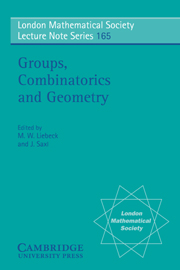Book contents
- Frontmatter
- Contents
- Authors' Addresses
- Introduction
- Part 1 Sporadic groups
- Part 2 Moonshine
- Part 3 Local and geometric methods in group theory
- Part 4 Geometries and related groups
- Part 5 Finite and algebraic groups of Lie type
- Part 6 Finite permutation groups
- 28 Some open problems on permutation groups
- 29 The genus of a permutation group
- 30 Primitive permutation characters
- 31 Closures of finite permutation groups and relation algebras
- Part 7 Further aspects of simple groups
- Part 8 Related topics
28 - Some open problems on permutation groups
Published online by Cambridge University Press: 07 September 2010
- Frontmatter
- Contents
- Authors' Addresses
- Introduction
- Part 1 Sporadic groups
- Part 2 Moonshine
- Part 3 Local and geometric methods in group theory
- Part 4 Geometries and related groups
- Part 5 Finite and algebraic groups of Lie type
- Part 6 Finite permutation groups
- 28 Some open problems on permutation groups
- 29 The genus of a permutation group
- 30 Primitive permutation characters
- 31 Closures of finite permutation groups and relation algebras
- Part 7 Further aspects of simple groups
- Part 8 Related topics
Summary
In the last decade, very many problems about permutation groups have been resolved using the classification of finite simple groups. In this article, I describe some problems which are still open, and some fields of research which are still relatively untilled. The problems concern transitivity, order, minimal degree and base size, fixed-point-free elements, reconstruction, etc.
INTRODUCTION
Even before the classification of finite simple groups was completed in 1980, it was clear that its impact on permutation group theory would be very dramatic. By an accident of fate, I happened to be considering these matters at the time. (My thoughts then are contained in my survey paper (1981).) The succeeding decade saw this impact working through the subject, with many expected and unexpected conclusions.
Among the consequences are (in no particular order):
(i) the determination of the 2-transitive groups, and of the rank 3 groups;
(ii) the determination of primitive groups of odd degree (except for affine groups, see later);
(iii) primitive groups of degree n are small (order at most nc log log n) with “known” exceptions;
(iv) a transitive permutation group of degree greater than 1 contains a fixed-point-free element of prime-power order.
In connection with the last fact, the existence of a fixed-point-free element is trivial, and was known to Frobenius; but that it can be taken to have primepower order requires the full force of the classification. The result has an application in number theory (Fein, Kantor and Schacher 1981). However, a closely related problem, raised much earlier by Isbell (1960) in the context of game theory, is still unsolved, and shows the limits of our knowledge.
Information
- Type
- Chapter
- Information
- Groups, Combinatorics and Geometry , pp. 340 - 350Publisher: Cambridge University PressPrint publication year: 1992
Accessibility standard: Unknown
Why this information is here
This section outlines the accessibility features of this content - including support for screen readers, full keyboard navigation and high-contrast display options. This may not be relevant for you.Accessibility Information
- 9
- Cited by
